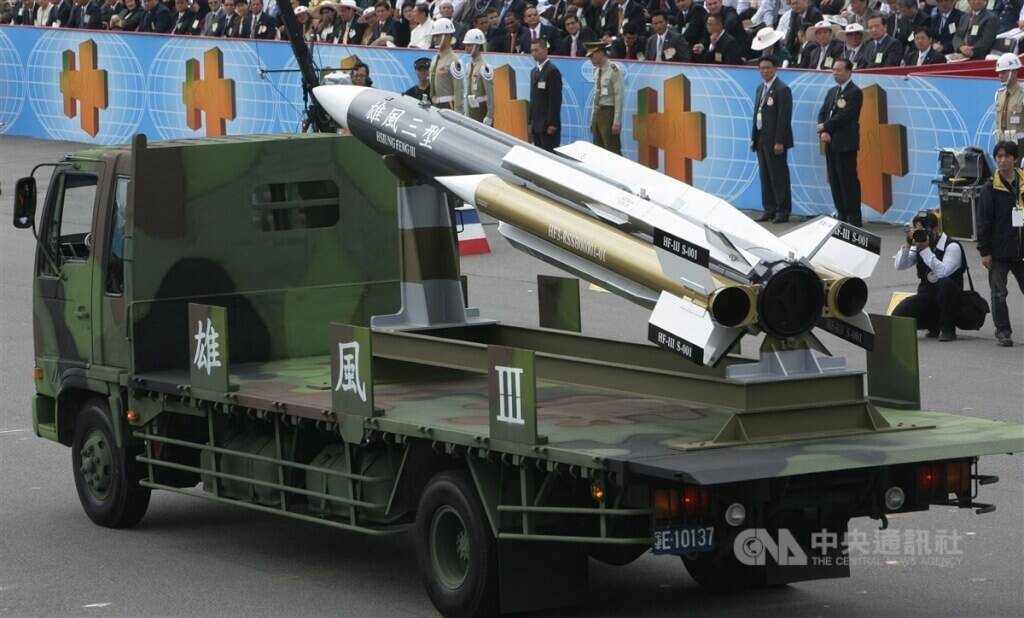The Ministry of National Defense (MND) confirmed Wednesday a media report detailing the alleged leaking of classified documents to Chinese intelligence personnel by a retired Air Force major, characterizing the incident as a case of Chinese infiltration.
The former Air Force officer, identified as Shih Chun- cheng (史濬程), was recruited by China after his retirement in 2008, the Chinese-language Mirror Media reported on Wednesday.
Shih approached then-Air Force Air Intercept Controller Hsu Chan-cheng (許展誠) and persuaded him to leak classified files in exchange for payment, which Shih delivered to his contacts in China, according to the report.

Photo: CNA
The report said that the classified information leaked included the Air Force’s applications of air-launched Hsiung Feng III anti-ship missiles and deployments in response to Chinese military incursions into Taiwan’s air defense identification zone.
In response, the MND said in a statement that the incident came to light in January 2023 when its Department of Strategic Planning filed a report stating that Shih, “pretending to be an American think tank staffer, approached active service members to engage in espionage.”
Prosecutors raided Shih’s residence in August 2024, and he and Hsu were indicted for violations of the National Security Act, the Classified National Security Information Protection Act, and the Anti-Corruption Act in December, according to the statement.
The case is currently being heard by the Taiwan High Court’s Taichung Branch, the MND said.
A source with knowledge of the matter confirmed with CNA on Wednesday that the Mirror Media report accurately identified the types of secret files leaked.
Shih was allegedly paid more than NT$1.5 million (US $45,509) for the documents he provided, NT$200,000 of which he shared with Hsu, according to the source.
The MND said the case shows that Chinese infiltration has never stopped and promised to continue educating officers and soldiers on the issue of espionage, while also working in close collaboration with the country’s national security apparatuses to root out spies.

The manufacture of the remaining 28 M1A2T Abrams tanks Taiwan purchased from the US has recently been completed, and they are expected to be delivered within the next one to two months, a source said yesterday. The Ministry of National Defense is arranging cargo ships to transport the tanks to Taiwan as soon as possible, said the source, who is familiar with the matter. The estimated arrival time ranges from late this month to early next month, the source said. The 28 Abrams tanks make up the third and final batch of a total of 108 tanks, valued at about NT$40.5 billion

Two Taiwanese prosecutors were questioned by Chinese security personnel at their hotel during a trip to China’s Henan Province this month, the Mainland Affairs Council (MAC) said yesterday. The officers had personal information on the prosecutors, including “when they were assigned to their posts, their work locations and job titles,” MAC Deputy Minister and spokesman Liang Wen-chieh (梁文傑) said. On top of asking about their agencies and positions, the officers also questioned the prosecutors about the Cross-Strait Joint Crime-Fighting and Judicial Mutual Assistance Agreement, a pact that serves as the framework for Taiwan-China cooperation on combating crime and providing judicial assistance, Liang

A group from the Taiwanese Designers in Australia association yesterday represented Taiwan at the Midsumma Pride March in Melbourne. The march, held in the St. Kilda suburb, is the city’s largest LGBTQIA+ parade and the flagship event of the annual Midsumma Festival. It attracted more than 45,000 spectators who supported the 400 groups and 10,000 marchers that participated this year, the association said. Taiwanese Designers said they organized a team to march for Taiwan this year, joining politicians, government agencies, professionals and community organizations in showing support for LGBTQIA+ people and diverse communities. As the first country in Asia to legalize same-sex

MOTIVES QUESTIONED The PLA considers Xi’s policies toward Taiwan to be driven by personal considerations rather than military assessment, the Epoch Times reports Chinese President Xi Jinping’s (習近平) latest purge of the Chinese People’s Liberation Army (PLA) leadership might have been prompted by the military’s opposition to plans of invading Taiwan, the Epoch Times said. The Chinese military opposes waging war against Taiwan by a large consensus, putting it at odds with Xi’s vision, the Falun Gong-affiliated daily said in a report on Thursday, citing anonymous sources with insight into the PLA’s inner workings. The opposition is not the opinion of a few generals, but a widely shared view among the PLA cadre, the Epoch Times cited them as saying. “Chinese forces know full well that